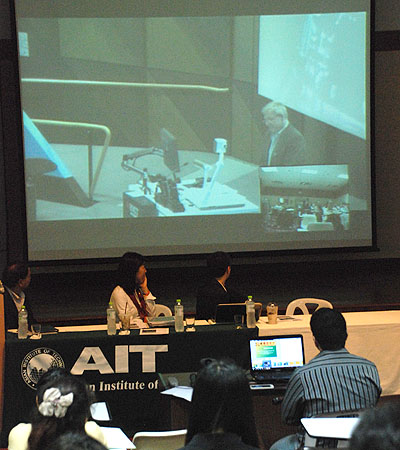Thanks to the wonders of video conference
technology – an International
Development Discussion on 16 October 2013 on the United Nations-led ‘Zero
Hunger Campaign’ connected students and
faculty of Australia’s Royal Melbourne Institute of Technology (RMIT) with AIT in a cyber-classroom, though 7000 kilometers and 4 times
zones apart.
Ms.
Yumiko Yamamoto, Programme
Specialist, UNDP Asia-Pacific Regional
Centre, and
Mr. Clovis Freire, Economic Affairs
Officer, United Nations Economic and
Social Commission for Asia and the Pacific (UNESCAP), spoke on the issue of hunger
and introduced elements of the
campaign that
was first proposed by United Nations Secretary-General Ban Ki-moon at
the United Nations Conference of Sustainable Development
(Rio+20). Later, the pair answered students’ questions in
person and via the Web.
Despite progress in combatting
hunger, one person in eight goes hungry in the world every day, Yamamoto told RMIT and AIT
students. In
fact, more than 60% of
the world’s poor and hungry live in Asia
and the Pacific, she said.
Yamamoto, who provides policy and programme advisory
services to the UNDP and development partners, stressed the
multidimensional nature of hunger. Though the world produces
enough food to feed its population of 7 billion-plus people, gaining
proper access to food remains a major issue. Disasters and climate
change also impact food availability, she said.
Adding a gender
perspective, Yamomoto stressed
that 60% of the undernourished are women or girls, and persistent gender inequalities remain in Asia and the
Pacific.More than 40%
of children in several Asia countries are
stunted, she added. By
reducing maternal hunger and
undernutrition, the current intergenerational cycle of
undernutrition can and must
be broken, she said.
Providing sizeable
momentum to solve this problem is
the ‘Zero Hunger Challenge’,
which is a post-Millennium Development
Goals 2015 (MDG) agenda to end global hunger in
our lifetime, Mr. Freire explained.
The contributing author
of UNESCAP
flagship publications, such as the Economic and Social Survey for Asia
and the Pacific, said the
global effort stresses that ending hunger will require that people have universal access
to adequate food all year round. It calls for all food systems to be
sustainable, and a for a 100 percent increase in smallholder
productivity and income. The Challenge has a goal to achieve zero
stunted children of less than 2 years of age, and zero loss or waste of
food across the globe.
According
to the ‘Zero Hunger Challenge’ website: “This requires
comprehensive efforts to ensure that every man, woman and child enjoy
their right to adequate food; women are empowered; priority is given to
family farming; and food systems everywhere are sustainable and
resilient.”
The
MDG target of halving the percentage of the
world’s people suffering from
hunger – from the figure of
23% in 1990-1992 – by 2015 is within reach, Freire
explained. He added: “All partners need to scale up their
efforts to eradicate hunger.”
Associate Professor
Rajendra Shrestha, Thematic Area
Leader, Natural Resources Management
Program, AIT and Associate Professor Paul
Battersby, RMIT, delivered respective
welcome remarks. Ms.
Nguyen Thi Hong Van, a
master’s student in the Gender Field
of Study was the main emcee at AIT, and AIT
Senior Media Specialist Mr. Shawn Kelly delivered the concluding
remarks. The event was organized at
AIT by the Media and Communications Unit
(MCU) and by Dr. Kyoko Kusakabe, Associate Professor, Gender and Development
Studies. Dr. Reina Ichii was the organizer for
RMIT and liaised with AIT and UNDP partners to coordinate the special
International Development Conversation.
See photo gallery here:
Facebook



